The Importance of Being Lillian Hellman
.
VERDICT: The San Sebastián Retrospective, devoted to Lillian Hellman, is even more timely now than when it was announced.
In addition to showcasing contemporary cinema, San Sebastián is famous for its programs focusing on the films of yesteryear, under the Klasikoak banner. The section, curated by the Festival and the Filmoteca Vasca in collaboration with the Filmoteca Española, consists of the eponymous batch of restored movies (including Barry Lyndon, whose new 4K incarnation, courtesy of Warner Bros. and Criterion, has been a must-see on the festival circuit since Cannes), as well as the themed Retrospective, which this year focuses on playwright and screenwriter Lillian Hellman.
First announced on May 8, the tribute to Hellman is arguably even more timely now that the event has kicked off, as it takes place during a time of major media turmoil in the United States. Mere days before the start of the Festival, news broke that Jimmy Kimmel’s late night talk show, a staple of the Disney-owned ABC since 2003, had been suspended indefinitely in the wake of the comedian’s comments on the death of right-wing activist Charlie Kirk. Given the comments made by the FCC before the decision, and Donald Trump right after, it was hard not to assume Kimmel’s First Amendment rights were being violated due to his outspoken criticisms of the current administration.
This is a scenario Lillian Hellman would be very familiar with, as viewers also got to experience first-hand with the screening of Dash and Lilly, the 1999 TV movie that completes the Retrospective alongside the fourteen titles Hellman wrote between 1935 and 1966, as well as Fred Zinnemann’s Julia (1977) which is based on a chapter from her memoir Pentimento. Directed by Kathy Bates, Dash and Lilly dramatizes Hellman’s on-and-off relationship with mystery novelist Dashiell Hammett, which lasted until his death in 1961.
As shown in the film, they were both blacklisted in the film world after being questioned by the House Un-American Activities Committee, and Hellman had to threaten to go to the press when the government initially refused to honor Hammett’s request to be buried at Arlington National Cemetery – which he was entitled to as a veteran of both World Wars. The movie originally aired on the A&E network on May 31, 1999, mere months after the 71st Academy Awards ceremony, during which multiple attendees refused to applaud when Elia Kazan, who had named names before the Committee in 1952, received an Honorary Oscar. It would make sense to rebroadcast the film today, although its renewed topicality might make it undesirable among FCC-fearing companies.
The Retrospective is also significant in light of the 2023 Writers Guild of America strike, as it gives new visibility to someone who was an eager early advocate for the union (she joined the initial incarnation, the Screen Writers Guild, in 1935), particularly when it came to the thorny question of being credited for the work. And in order to give a complete picture of Hellman’s work in Hollywood, San Sebastián is screening the three films on which she went uncredited, including The Westerner (1940), the third of five collaborations with William Wyler, arguably her closest friend in the moviemaking universe.
The partnership between Wyler and Hellman is also an interesting time capsule of how the film industry’s attitude towards sexuality, with two versions of the same story. In 1936, Hellman was hired to adapt her play The Children’s Hour for the screen, but due to the Hays Code the alleged lesbian relationship at the center of the story had to be changed to a heterosexual love triangle. The censors also forbade the use of the original title, so the film became known under the moniker These Three. 25 years later, Wyler and Hellman reteamed for a new adaptation that retained the play’s title and reinstated the original plot (the only major change, again for censorship reasons, was the suicide method used by one of the characters). Both versions, like all other titles in the Retrospective, can be enjoyed at the Principe cinema, though sadly not back to back.

